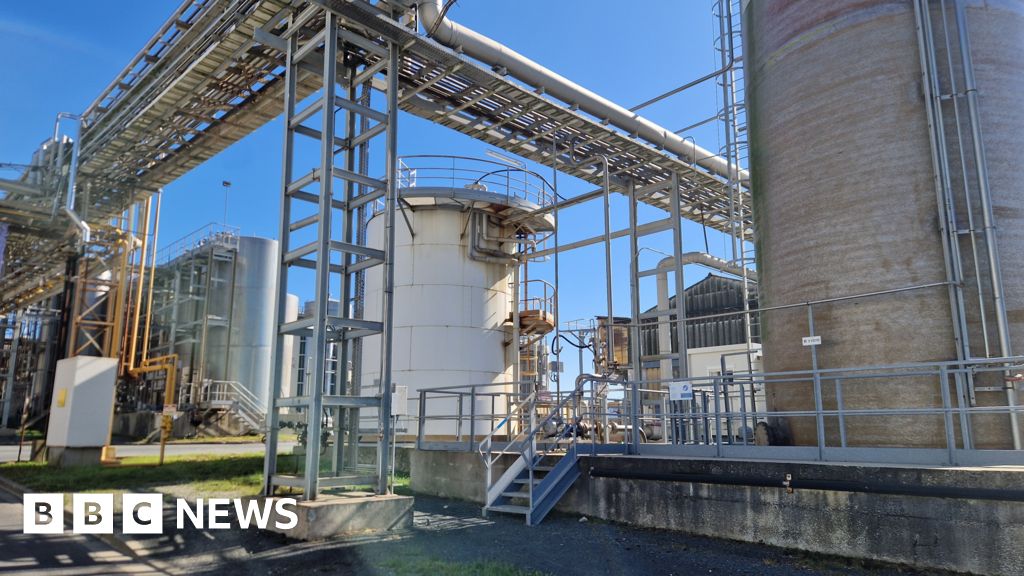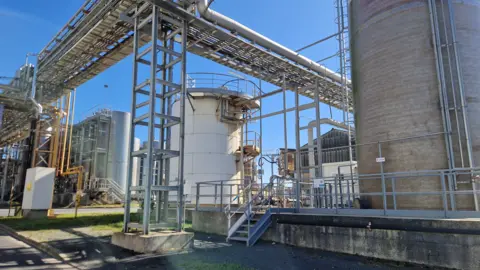 BBC
BBCFor almost 80 years rare earth metals have been pumped out of this industrial plant in La Rochelle on France’s west coast.
But as the materials become more and more crucial to the global economy, chemicals firm Solvay is expanding its processing plant next to the glistening Atlantic Ocean to meet surging demand across Europe.
This group of 17 metals are essential to huge amounts of modern technology such as smartphones, electric vehicles and wind turbines and MRI scanners.
However, around 70% of rare earths mining, and 90% of refining, happens in China, as a result of years of support from the Chinese government.
Europe, like many other parts of the world, is trying to reduce its dependence on importing these key metals from China. The future of Solvay’s plant will be critical to those ambitions.
“This is a market that is growing fast, and, also, there is a greater demand for shorter supply chains,” says Solvay’s CEO Philippe Kehren.
The Covid pandemic and the war in Ukraine have made companies and politicians try to remove some of the vulnerabilities in their supply chains.
“When you have a material that is coming almost 100% from one specific location, if you are dependent on this, you want to diversify your sourcing. This is what we can offer,” explains the boss of the Belgian chemicals giant.
That is why the EU’s Critical Raw Materials Act came into force last year. It sets targets for reducing dependence on imports for the extraction, processing and recycling of the most important substances by 2030.
Europe only has two rare earth processing facilities, one in Estonia and this one in western France. It is the only plant outside of China that can process all 17 different rare earths.
The increased investment in the facility comes as it is moving away from focusing on supplying rare earths for catalytic convertors, to instead focus on soaring demand for the magnets that are essential to electric car batteries, advanced electronics and defence systems.
For now the focus is on recycling rare earths that are already in Europe. “We think that we can probably produce 30% of the rare earths needed by Europe just by recycling end of life motors and other equipment,” says Mr Kehren.
As demand continues to grow that will change, and more virgin material will be needed from countries such as Brazil, Canada and Australia.
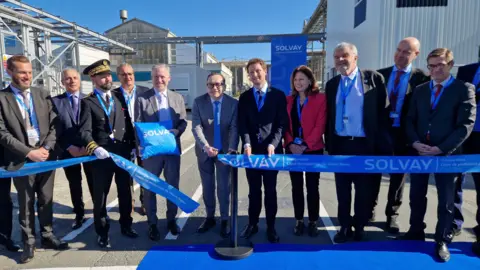 BBC / Jonathan Josephs
BBC / Jonathan JosephsThere are no operational rare earth mines in Europe. Projects in Norway and Sweden are amongst the most advanced, but its likely to be another decade before they are ready.
“I think it’s absolutely necessary to have our own mines, not necessarily a lot of them, because we can have a mix, but it’s important to have our own sourcing,” says Mr Kehren.
It is a complex process to turn those materials into the powders that are the end product of this plant.
It requires approximately 1,500 processes, and given the unique capabilities of this facility, outsiders are rarely allowed in. This is due to concerns about rivals potentially gaining some of the knowledge that is currently otherwise concentrated in China.
However we’ve been granted special access to one of the separation rooms that are a vital part of the closely-guarded know-how built up since this plant started operating in 1948.
“The objective of the liquid separation unit will be to purify cerium on one side, lanthanum on the other side,” explains production manager Florian Gouneau as we walk up a flight of metal stairs.
“It’s basically like if you have a multi fruit juice with orange juice, apple juice, pineapple juice, the objective of the liquid separation unit will be to separate apple juice on one side, orange juice on the other side, and so on.”
The room itself is about the size of a football pitch, and home to row after row of huge metal vats within which chemical reactions force the different rare earths apart.
This 40-hectare site employs more than 300 people. A vast collection of industrial buildings are joined together by an array of metal pipes moving substances through the processes.
Significant amounts of chemicals are stored in cylindrical tanks, and give the facility a distinct smell that is similar to a freshly-cleaned hospital ward.
I ask Mr Gouneau if he’s used to it after working here for three years. “What smell?” he jokingly replies.
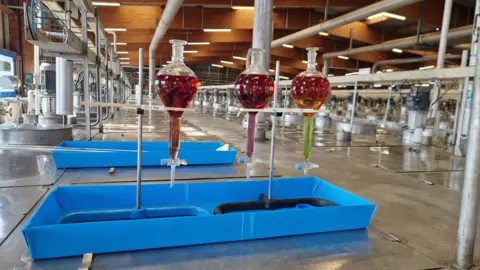 BBC / Jonathan Josephs
BBC / Jonathan JosephsThe site is also distinctly noisy and warm as vents continually hum. They expel hot air into an atmosphere that is also punctuated by seagulls unaware that they have a unique view of one of the most important frontlines in the global economy.
The French government is supporting this facility with about €20m ($23m; £17.4m) in tax credits.
“Having a dependency on a single source – it is dangerous because you cannot know what will happen to this source for various reasons,” says Benjamin Gallezot, who is President Macron’s adviser on strategic minerals and metals.
“It can be a geopolitical reason, but it can also be, you know, natural disaster or whatever.”
In the blazing sun he won’t be drawn on the impact of China trying to restrict access to its rare earths exports, a subject at the heart of continuing US China trade talks.
But Mr Gallezot does say: “I think economic cooperation is clearly more powerful than just only pure competition.”
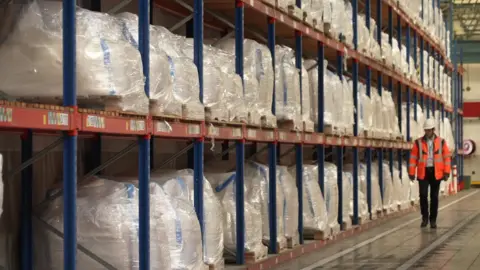 BBC / Tracey Langford
BBC / Tracey LangfordThe European Parliament wants the European Commission to do more to reduce that dependence on Chinese rare earths. It says Beijing’s controls are “unjustified” and “intended to be coercive”.
On a recent visit to Germany, China’s foreign minister Wang Yi said it was his country’s “sovereign right”, as well as being “common practice”, to control exports of goods that have both commercial as well as military uses.
That stance explains why securing access to raw materials has been at the heart of recent EU trade deals, such as the one it signed with Argentina, Brazil, Paraguay and Uruguay last year.
Western firms in the rare earths sector say they need more government support if they are going to catch-up with their Chinese rivals.
Rafael Moreno, the CEO of Australia’s Viridis Mining, says this backing, both regulatory and financial, “is the key right now”. His business is developing a vast rare earths mine in Brazil, which hopes to provide as much as 5% of the world’s rare earths.
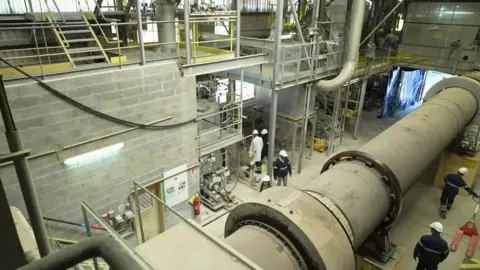
One reason China has forged ahead of the rest of the world regarding rare earths is that it has been more willing to handle the radioactive pollution that can be caused by the mining and processing.
Solvay also has rare earth operations in China, and Mr Kehren says “there are solutions to do it in a very responsible way without polluting”. He adds: “It costs a bit of money, so you need to be ready to pay a little bit more.”
Pricing is key to the future of the expanded La Rochelle plant, he says. He needs his customers, who supply carmakers and big tech firms, to commit to buying certain volumes of rare earths at certain prices.
The EU has written its targets for lowering imports into law, but he wants to see how they make them happen. “Are there going to be [financial] incentives, for example, for the different players in this value chain to source rare earth elements from Europe?”
Doing so would, he says, be good for the continent’s economy.


